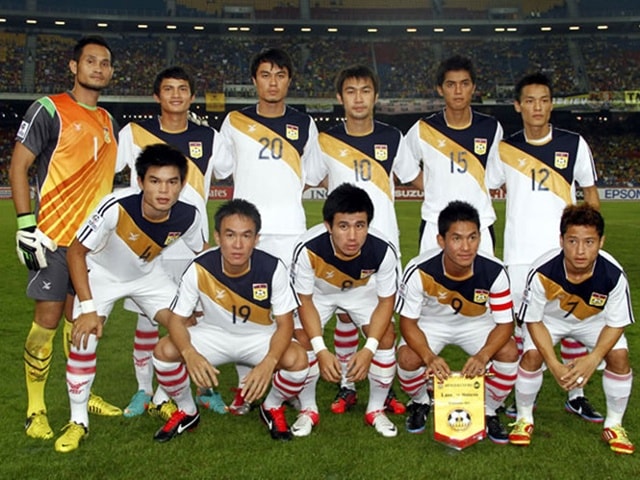Revealing unusual matches of Lao football
In early 2014, the Asian Football Confederation decided to launch a general attack to bring to light the players, coaches, and football officials who “sold themselves to the devil” to bring the integrity of the “king” sport in the continent. Less than a year later, the Lao national teams became the top target of the investigation with a series of matches showing signs of irregularities.
From the match-fixing attack
Since 2010, Asian football has been on the map of corruption and match-fixing scandals. In 2011, the image of professional football in South Korea was severely damaged after 41 players were banned for life for fixing dozens of matches in the country’s top leagues. In the same year, the world was even more shocked when a fake Togo team “traveled” to Bahrain for a friendly match, “directed” by Singaporean tycoon Wilson Raj Perumal, who was convicted of having a hand in fixing more than 300 matches worldwide.
 |
| Lao football has been under investigation for match-fixing since 2014. Photo: goal.com |
Two years later, Asian sports were rocked by the case of 33 Chinese players, coaches and officials who were put on trial and banned for life for their involvement in a corruption and match-fixing scandal. At the same time, Europol announced that there were about 680 matches worldwide that had their results “distorted”. According to Europol’s investigation, the match-fixing cases all originated in Asia, with at least 425 people involved, including referees, players, coaches, team officials and members of many criminal gangs. The investigation led to the arrest of 14 people in Singapore, including the leader of the notorious illegal betting ring, Dan Tan.
Faced with the widespread problem of match-fixing, the Asian Football Confederation (AFC) has begun planning a comprehensive attack to eradicate and combat the threat of match-fixing in the continent by signing an agreement with the Swiss company Sportradar. According to the terms of the agreement, Sportradar will monitor tournaments including the AFC Champions League, AFC Cup, Asian Cup, regional and international football championships, World Cup qualifiers and football at the Asian Games...
“This is a very important collaboration and the latest step in our campaign to eradicate match-fixing,” an AFC statement said after partnering with Sportradar, whose data has since led to a series of match-fixing cases, with Laos football being one of the main targets of the investigation.
To the "selling oneself to the devil" case of Lao football
At the end of September 2014, Sportradar issued a “red alert” about the suspicion of match-fixing in the U.23 men’s football tournament of the 17th Asian Games hosted by South Korea. This event took place from September 19 to October 4, 2014. According to Sportradar, analysis of betting data showed that some matches may have been fixed. “We can confirm that there was match-fixing in the men’s football tournament of the Asian Games. A number of online bettors were extremely confident in betting on a goal at the end of the match for some matches. The betting markets for fixed matches often show similar signs, of which live betting while the match is in progress is the most suspicious,” Andreas Krannich, Director of Sportradar, stated.
The suspicious matches in Sportradar's list were later exploited by The New Paper. Accordingly, in the 3 matches suspected of match-fixing at the 2014 Asian Games, there were 2 matches with the participation of the Laos team, which were the defeats against Malaysia (0-4) and Saudi Arabia (0-3) in Group A. In these 2 matches, 6/7 goals conceded by the Laos team all occurred in the final minutes of the match and were classified by Sportradar as a category 1 warning for suspected match-fixing.
According to Sportradar's analysis, before the second match against Malaysia on September 17, 2014, the Asian Handicap system showed a large number of bets on Malaysia's handicap of 3 goals, meaning that Laos would lose by at least 4 goals. Malaysia scored an early goal to take the lead 1-0 in the 12th minute. The score remained unchanged after the 60th minute, but according to Sportradar, at this time there was at least one Asian betting website that maintained the above odds (Malaysia's handicap of 3 goals), meaning that Malaysia would have to score at least 3 more goals and not concede in the rest of the match to win the bet.
The following developments followed the “script” of the odds when Malaysia scored 3 goals in a row in the 76th, 79th and 83rd minutes. Meanwhile, in the first match of Group A, the Laos team was also considered to be “acting” when Saudi Arabia scored all 3 goals from the 75th minute onwards. Not only that, in the last match, losing 0-2 to South Korea, Laos also conceded 1 goal in the 89th minute.
The data provided by Sportradar comes from a FIFA investigation in 2010, showing that Lao football was already on the “blacklist” before the 17th Asian Games. That was Laos’ 1-4 defeat to host Malaysia at Bukit Jalil Stadium in the group stage of the 2012 AFF Cup. This match was placed on the level 2 match-fixing warning by Sportradar with appropriate odds when the Lao team lost by 3 goals, helping a large amount of money win on Asian Handicap.
According to TNO
